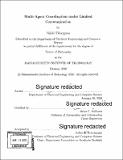Multi-agent coordination under limited communication
Author(s)
Bhargava, Nikhil(Nikhil Gaurev)
Download1202815183-MIT.pdf (23.96Mb)
Other Contributors
Massachusetts Institute of Technology. Department of Electrical Engineering and Computer Science.
Advisor
Brian C. Williams.
Terms of use
Metadata
Show full item recordAbstract
In this thesis, we present a theory for constructing real-time executives that can reason about communication between agents. In multi-agent coordination problems, different agents have different beliefs about the state of the world that can eventually be reconciled if the agents are able to share sufficient information with one another. When communication is limited, this task becomes more difficult. To achieve robustness, coordination decisions need to be made, executed, and adapted in real-time by a real-time executive. Most existing real-time executives rely on perfect knowledge of the state of the world, making it difficult to use them in scenarios where agents either cannot or prefer not to communicate and share information. This thesis offers three contributions that together provide the basis for constructing a real-time executive capable of handling multi-agent coordination under limited communication. First, we introduce delay controllability as a way to augment the input plan representation to including a communication model. Delay controllability lets us reason about multi-agent activities under limited communication in the form of communication delays and provides a guarantee that problem evaluation is tractable. Second, we provide a way to indicate by when each agent must communicate the results of their actions. Many agents have flexibility in choosing exactly when to communicate. We provide an algorithm for choosing a low-cost set of moments to communicate and present a strategy for adjusting those strategies when communication networks are unreliable causing disruptions in the original communication plan. Third, we offer a way to model noisy communication. Noisy communication offers approximate temporal information that is useful during execution but is generally difficult to incorporate. We introduce variable-delay controllability as a way to model this kind of communication and provide the first sound and complete algorithm for incorporating noisy information that runs in polynomial time.
Description
Thesis: Ph. D., Massachusetts Institute of Technology, Department of Electrical Engineering and Computer Science, 2020 Cataloged from PDF of thesis. Includes bibliographical references (pages 239-244).
Date issued
2020Department
Massachusetts Institute of Technology. Department of Electrical Engineering and Computer SciencePublisher
Massachusetts Institute of Technology
Keywords
Electrical Engineering and Computer Science.